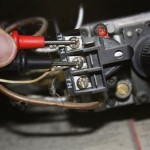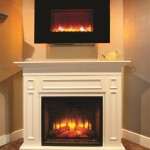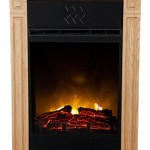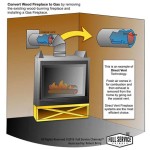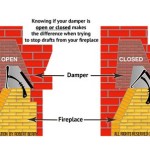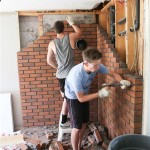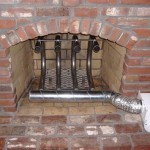Gas Log Fireplace Insert Installation: A Comprehensive Guide
Gas log fireplace inserts offer a convenient and aesthetically pleasing alternative to traditional wood-burning fireplaces. They provide the ambiance of a fire without the hassle of gathering firewood, starting a fire, and cleaning up ashes. Installing a gas log fireplace insert, however, requires careful planning, preparation, and adherence to safety regulations. This article provides a comprehensive guide to the process, covering essential aspects from initial assessment to final testing.
Before embarking on a gas log fireplace insert installation, it is crucial to understand the different types of inserts available. Broadly, they are categorized into vented and vent-free (also known as ventless) models. Vented gas logs mimic the appearance of a real wood fire and require a working fireplace chimney to vent combustion byproducts. They produce realistic flames and generate radiant heat but are less efficient in terms of heating the room. Vent-free gas logs, on the other hand, do not require a chimney and are designed to burn more efficiently, heating the room more effectively. However, they produce less realistic flames and require adequate ventilation to prevent the buildup of carbon monoxide and other harmful gases. Choosing the right type depends on individual preferences, existing fireplace infrastructure, and local building codes.
Safety is paramount when dealing with gas appliances. It is strongly recommended to hire a qualified and licensed professional to install a gas log fireplace insert. These professionals possess the necessary expertise to ensure proper installation, gas line connections, and ventilation, minimizing the risk of gas leaks, carbon monoxide poisoning, and fire hazards. Attempting a DIY installation without adequate knowledge and experience can be dangerous and potentially violate local regulations.
Assessing the Existing Fireplace
The first step in the installation process involves thoroughly assessing the existing fireplace. This assessment determines the suitability of the fireplace for a gas log insert and identifies any necessary modifications. The primary considerations include the fireplace opening dimensions, the condition of the chimney or vent system, and the availability of a gas supply line.
The fireplace opening must be large enough to accommodate the chosen gas log insert. Measure the width, height, and depth of the fireplace opening and compare these dimensions to the insert's specifications. Ensure that there is sufficient clearance around the insert for proper ventilation and ease of installation. Furthermore, the firebox should be free from any cracks or damage that could compromise its structural integrity.
The chimney or vent system plays a crucial role in safely venting combustion byproducts, especially for vented gas logs. The chimney should be inspected for any blockages, cracks, or deterioration. A professional chimney sweep can perform a thorough inspection and cleaning to ensure that the chimney is in good working order. If the chimney is damaged or inadequate, it may need to be repaired or relined before installing the gas log insert. For vent-free models, proper ventilation within the room is essential to prevent the buildup of harmful gases. Check local building codes for specific ventilation requirements.
Access to a gas supply line is essential for operating a gas log fireplace insert. The gas line should be properly sized and installed according to local codes. A qualified plumber or gas technician can install a new gas line or extend an existing one to the fireplace location. Ensure that the gas line is equipped with a shut-off valve for safety and maintenance purposes. The gas pressure should also be checked to ensure it meets the insert's requirements.
Preparing for Installation
Once the fireplace assessment is complete, the next step is to prepare the area for installation. This involves gathering the necessary tools and materials, cleaning the fireplace, and ensuring adequate ventilation. Proper preparation ensures a smooth and efficient installation process.
Gather the required tools, including a screwdriver set, adjustable wrench, pipe wrench, level, measuring tape, drill, and safety glasses. The specific tools may vary depending on the type of gas log insert and the complexity of the installation. Ensure that all tools are in good working order before starting the installation.
Thoroughly clean the fireplace to remove any ashes, soot, or debris from previous fires. Use a vacuum cleaner or brush to remove loose material. For stubborn stains, use a fireplace cleaner specifically designed for removing soot and creosote. A clean fireplace provides a better surface for installing the gas log insert and reduces the risk of dust and debris entering the room during installation.
As previously mentioned, proper ventilation is crucial for both vented and vent-free gas log inserts. Ensure that the room is adequately ventilated during installation to prevent the buildup of harmful gases. Open windows and doors to provide cross-ventilation. For vent-free models, ensure that the room meets the minimum ventilation requirements specified by the manufacturer and local building codes.
Installing the Gas Log Fireplace Insert
The installation process varies depending on the type of gas log insert and the existing fireplace infrastructure. It is essential to follow the manufacturer's instructions carefully and adhere to all safety regulations. The following provides a general overview of the installation process.
First, install the gas line connection. This involves connecting the gas supply line to the gas valve on the gas log insert. Use pipe thread sealant to ensure a leak-proof connection. Tighten the connections securely with a pipe wrench. After making the connections, test for gas leaks using a soap solution. Apply the soap solution to the connections and look for bubbles. If bubbles appear, tighten the connections further or replace the fittings if necessary. Never use an open flame to test for gas leaks.
Next, position the gas logs within the fireplace. Refer to the manufacturer's instructions for the correct placement of the logs. The logs should be arranged in a way that provides a realistic flame pattern and adequate air circulation. Ensure that the logs are not blocking the gas burner or vents. Secure the logs in place using the brackets or clips provided with the gas log insert.
Finally, connect the gas log insert to the gas valve. This typically involves attaching a flexible gas line from the gas valve to the burner assembly. Ensure that the connection is secure and leak-proof. Test the gas log insert to ensure that it is operating correctly. Light the burner according to the manufacturer's instructions. Observe the flame pattern and adjust the gas flow if necessary. Check for any unusual odors or noises during operation. If you detect any problems, turn off the gas supply and consult a qualified technician.
After completing the installation, thoroughly inspect the entire system to ensure that all connections are secure and that the gas log insert is operating safely. Check for gas leaks using a soap solution. Monitor the carbon monoxide levels in the room to ensure that the ventilation is adequate. Provide the homeowner with instructions on how to operate and maintain the gas log insert. Emphasize the importance of regular maintenance and safety inspections.
Following these guidelines helps ensure a safe and efficient gas log fireplace insert installation. Remember to prioritize safety and consult with qualified professionals throughout the process.
How To Install Gas Fireplace Insert Heat Glo

Installing A Gas Fireplace

Gas Logs Vs Inserts What To Know Home Hearth Outfitters

Fireplace Insert Guide Fireplaces Direct Learning Center

Gas Fireplace Insert Cost Forbes Home

Convert To Gas Installing Fireplace Inserts Doctor Flue

How To Install A Gas Fireplace Insert This Old House

Fireplace Insert Basics Portland Or American Chimney

Gas Fireplaces Fireplace Inserts Propane Redwood City Ca

The Top 3 Reasons To Choose A Gas Insert Over Log Set Hearthside Hearth Blog

